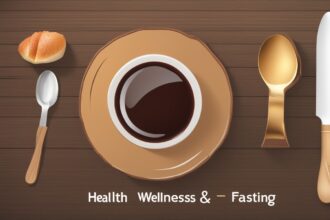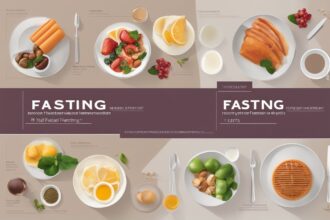Have you ever wondered if skipping a meal could actually be good for you? fasting, a practice as old as humanity itself, is making a modern comeback—and for good reason. The health benefits of fasting are backed by science and embraced by millions for improved physical and mental well-being. Whether you’re curious about intermittent fasting, water fasting, or other methods, this ancient practice offers a powerful way to reset your body and mind. In this post, we’ll dive into the transformative effects of fasting, explore the research behind it, and share actionable tips to help you get started safely. Let’s uncover why fasting might just be the health boost you’ve been searching for!
What Is Fasting and Why Does It Matter?
Fasting is the voluntary abstention from food and, sometimes, drink for a specific period. It’s not just about weight loss—though that’s a popular perk. The health benefits of fasting extend far beyond the scale, touching everything from cellular repair to mental clarity. Historically, fasting has been part of religious and cultural traditions worldwide, but today, science is catching up, showing us how this practice can optimize our biology. From intermittent fasting (like the 16/8 method, where you fast for 16 hours and eat during an 8-hour window) to extended fasts, there’s a style for everyone. So, why does it matter? Fasting triggers unique processes in the body that promote healing and longevity—let’s break them down.
Physical Health Benefits of Fasting: A Body Reset
When you fast, your body shifts gears. Without incoming food, it taps into stored energy, initiating processes that can transform your physical health. One of the most well-known fasting health advantages is weight loss. Fasting helps create a calorie deficit and boosts metabolism by increasing levels of norepinephrine, a hormone that enhances fat burning. But the benefits don’t stop there. Research shows fasting can improve insulin sensitivity, making it a game-changer for managing blood sugar levels and reducing the risk of type 2 diabetes. Studies, like those published in the journal Obesity, highlight how intermittent fasting can lower insulin resistance effectively.
Beyond that, fasting promotes autophagy—a cellular “cleanup” process where your body removes damaged cells and regenerates healthier ones. This mechanism, studied extensively in recent years, is linked to reduced inflammation and a lower risk of chronic diseases like cancer and heart disease. Simply put, the physical benefits of fasting are a natural way to hit the reset button on your body’s systems.
Mental and Emotional Gains from Fasting
While the physical perks are impressive, the mental health benefits of fasting are equally compelling. Ever noticed how a clear mind often follows a lighter body? Fasting can enhance brain function by increasing the production of brain-derived neurotrophic factor (BDNF), a protein that supports neuron growth and protects against neurodegenerative diseases like Alzheimer’s. A 2018 study in Frontiers in Molecular Neuroscience found that fasting boosts BDNF levels, potentially improving memory and mood.
Additionally, many fasters report heightened focus and emotional resilience. When you’re not constantly digesting food, your body conserves energy, often leading to a sense of mental sharpness. For some, fasting also fosters mindfulness, as it encourages you to tune into hunger cues and emotional triggers. If you’re looking for natural ways to reduce stress or anxiety, exploring the fasting mental clarity benefits might be worth a try.
Fasting for Longevity and Disease Prevention
Could fasting help you live longer? Emerging research suggests it might. The health benefits of fasting include activating pathways linked to longevity, such as the sirtuin genes, which play a role in aging and DNA repair. A study from the University of Southern California found that periodic fasting cycles can reduce markers of aging and lower the risk of age-related diseases. By reducing oxidative stress and inflammation—two key drivers of aging—fasting acts as a shield against the wear and tear of time.
Moreover, fasting shows promise in preventing chronic illnesses. It can lower blood pressure, improve cholesterol levels, and reduce the risk of cardiovascular issues. For those worried about cancer, early studies indicate that fasting may make cancer cells more vulnerable to treatment while protecting healthy cells. While more research is needed, the potential of fasting for disease prevention is an exciting frontier in health science.
Practical Tips to Start Fasting Safely
Ready to experience the health benefits of fasting for yourself? Starting can feel daunting, but with the right approach, it’s manageable and even enjoyable. The key is to ease into it and listen to your body. Here are some practical tips to help you begin your fasting journey:
- Start Small: If you’re new, try a 12-hour fast overnight (e.g., stop eating at 8 PM and eat again at 8 AM). Gradually increase to a 16/8 intermittent fasting schedule.
- Stay Hydrated: Drink plenty of water during fasting periods to avoid dehydration and support detoxification processes.
- Break Your Fast Wisely: Avoid heavy, processed meals when ending a fast. Opt for light, nutrient-dense foods like vegetables, lean protein, or broth.
- Listen to Your Body: If you feel dizzy or overly fatigued, scale back. Fasting should feel sustainable, not punishing.
- Consult a Professional: If you have medical conditions like diabetes or are pregnant, speak with a healthcare provider before fasting.
Common Challenges and How to Overcome Them
Let’s be real—fasting isn’t always a walk in the park. Hunger pangs, irritability, and social pressures can test your resolve. But understanding these challenges and having strategies to tackle them can make all the difference in reaping the fasting wellness benefits. Below are some common hurdles and solutions to keep you on track:
- Hunger Cravings: Distract yourself with activities like walking or journaling. Herbal teas or black coffee (without sugar) can also curb appetite.
- Energy Dips: Ensure you’re getting enough rest and electrolytes (like sodium or potassium) during fasting windows to maintain energy.
- Social Eating Pressures: Plan fasting around social events or communicate your goals to friends and family for support.
- Overeating Post-Fast: Portion control is key. Prepare meals in advance to avoid bingeing after a fast.
In conclusion, the health benefits of fasting are vast and well-supported by science, offering a natural, accessible way to enhance your physical vitality, mental sharpness, and even longevity. From kickstarting weight loss to protecting against chronic diseases, fasting is more than a trend—it’s a lifestyle tool with profound potential. Whether you’re drawn to intermittent fasting or curious about longer fasts, starting small and staying mindful can help you unlock these rewards. Remember, fasting isn’t a one-size-fits-all solution, so tailor it to your needs and always prioritize safety. Why not give it a try and see how the transformative power of fasting feels for you? Share your experiences or questions below—I’d love to hear how fasting fits into your wellness journey!






